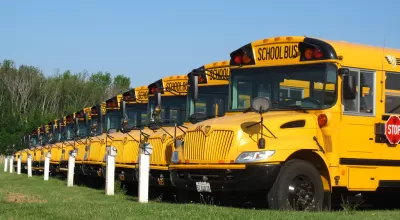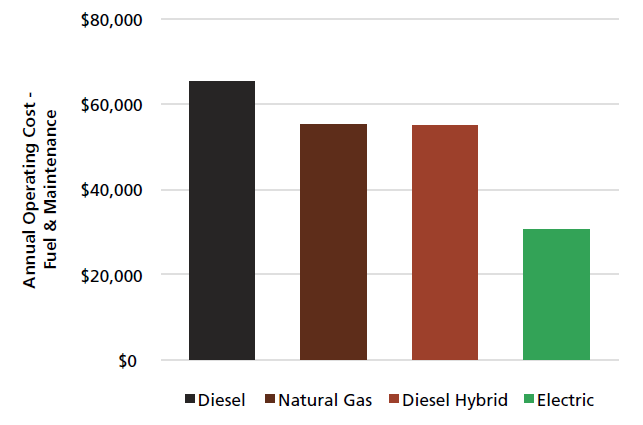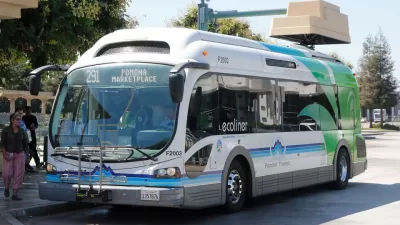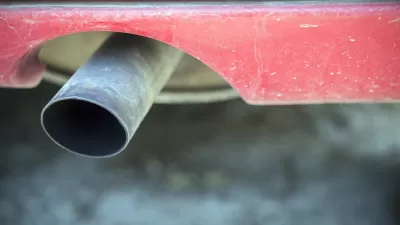U.S. PIRG wants states to use funding from multi-billion dollar Volkswagen settlements to convert the nation's school bus fleet, 95% of which is diesel-powered, to zero-emission buses to reduce children's exposure to toxic air pollution.

The campaign, launched May 3 by the United States Public Interest Research Group (U.S. PIRG), touts the public health and environmental benefits of converting the nation's 480,000 school vehicles to zero-emission buses. It coincides with the release of a new report, “Electric Buses: Clean Transportation for Healthier Neighborhoods and Cleaner Air" [pdf], by the U.S. PIRG Education Fund, Environment America Research & Policy Center, and the Frontier Group.
Approximately 95 percent of U.S. school buses run on diesel, even though numerous studies have shown that inhaling diesel exhaust can cause respiratory diseases and worsen existing conditions such as asthma. The negative effects are especially pronounced in children.
The good news is that all-electric buses are available and ready to roll, and they’re cleaner, healthier and often cheaper for school districts and bus contractors to run in the long-term. And with zero tailpipe emissions, electric school buses can significantly reduce our kids’ exposure to toxic fumes.
Figure ES-1. Estimated Annual Operating Costs of Transit Buses, by Fuel Type

Courtesy of U.S. PIRG
Currently there are pilot programs run by California (Los Angeles County and Gilroy), Massachusetts and Minnesota to test zero-emission school buses. They may involve the conversion of diesel buses as well as purchasing new ones.
One source of funding stems from the $14.7 billion settlement, as well as subsequent settlements in the Volkswagen diesel emissions scandal, first exposed in September 2015 by West Virginia University researchers.
"The VW Environmental Mitigation Trust [stemming from the Volkswagen Clean Air Act Civil Settlement] will provide states with a total of $2.9 billion for projects to cut nitrogen oxide from large vehicles, including school buses," reports Thomas McMahon for the School Bus Fleet blog on April 25. However, school districts will have lots of competition for these funds from transit buses, trucks and other commercial applications ranging from forklifts to port cargo handling equipment.
The report also looked at the environmental benefits of converting the nation's 70,000 transit buses to battery-electric. More than 60 percent run on diesel, 18 percent on natural gas, while just 0.2 percent of buses are all-electric.
Hat tip to AASHTO Journal.
FULL STORY: Electric Buses: Clean Transportation for Healthier Neighborhoods and Cleaner Air

Maui's Vacation Rental Debate Turns Ugly
Verbal attacks, misinformation campaigns and fistfights plague a high-stakes debate to convert thousands of vacation rentals into long-term housing.

Planetizen Federal Action Tracker
A weekly monitor of how Trump’s orders and actions are impacting planners and planning in America.

In Urban Planning, AI Prompting Could be the New Design Thinking
Creativity has long been key to great urban design. What if we see AI as our new creative partner?

King County Supportive Housing Program Offers Hope for Unhoused Residents
The county is taking a ‘Housing First’ approach that prioritizes getting people into housing, then offering wraparound supportive services.

Researchers Use AI to Get Clearer Picture of US Housing
Analysts are using artificial intelligence to supercharge their research by allowing them to comb through data faster. Though these AI tools can be error prone, they save time and housing researchers are optimistic about the future.

Making Shared Micromobility More Inclusive
Cities and shared mobility system operators can do more to include people with disabilities in planning and operations, per a new report.
Urban Design for Planners 1: Software Tools
This six-course series explores essential urban design concepts using open source software and equips planners with the tools they need to participate fully in the urban design process.
Planning for Universal Design
Learn the tools for implementing Universal Design in planning regulations.
planning NEXT
Appalachian Highlands Housing Partners
Mpact (founded as Rail~Volution)
City of Camden Redevelopment Agency
City of Astoria
City of Portland
City of Laramie





























